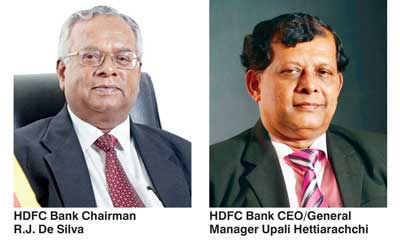Wednesday Feb 18, 2026
Wednesday Feb 18, 2026
Thursday, 31 March 2016 00:00 - - {{hitsCtrl.values.hits}}
 Housing Development Finance Corporation Bank of Sri Lanka (HDFC Bank) has achieved a pre-tax profit of Rs. 972 million for the year ending 31 December 2015. This is a 25% increase over the previous year’s figure of Rs. 777 million. The post-tax profit was Rs. 515 million compared to the Rs. 375 million achieved in 2014, an increase of 37%.
Housing Development Finance Corporation Bank of Sri Lanka (HDFC Bank) has achieved a pre-tax profit of Rs. 972 million for the year ending 31 December 2015. This is a 25% increase over the previous year’s figure of Rs. 777 million. The post-tax profit was Rs. 515 million compared to the Rs. 375 million achieved in 2014, an increase of 37%.
HDFC Bank CEO/General Manager Upali Hettiarachchi said, “HDFC Bank’s strong performance in 2015 is a result of the many initiatives undertaken by the management during the year and the commitment of our staff. The growth in the SME sector has also contributed to the overall results and the bank is further taking steps in widening its customer base by focusing on low and middle income segment.”
The bank’s interest income also rose from Rs. 4,378 million in 2014 to Rs. 4,659 million in 2015, a growth of 6.41%. The net interest income rose from Rs. 1,843 million to Rs. 2,120 million – an increase of 15%, while fee-based income rose from Rs. 211 million to Rs. 268 million, an increase of 27%. HDFC Bank’s loan book grew to Rs. 26,688 million by end 2015, an increase of 14.27% over the previous year’s figure of Rs. 23,357 million. The deposit base also increased from Rs. 24,479 million to Rs. 28,593 million, an increase of 16.81%. The bank also achieved a steady growth in its asset base, from Rs. 34,418 million to Rs. 41,417 million in 2015, a growth of 20.34%.
Commenting on the performance during the year HDFC Bank Chairman R.J. De Silva said, “I am very happy to note the performance of the bank and I believe the bank can remain a strong player in the Sri Lankan financial landscape. Prior to 2014, HDFC’s business model was almost entirely housing finance based, which exposed the bank to extremely high financial and market risks. After the amendments to the HDFC Act, the bank began diversifying the product portfolio beyond housing finance. In 2015, we consolidated this process, which has contributed significantly towards mitigating our financial risk factors and towards improving our competitiveness. In fact, SMEs grew 61% in 2015 compared to 2014.”
Due to high quality credit evaluation process, the bank experienced a slight decrease (excluding EPF backed loans) in NPL from 9.81% in 2014 to 8.26%. In gross non-performing loans (NPLs), decrease from 22.57% in 2014 to 20.77% last year.
The Return on Assets (ROA) (PBT) reached 2.56% compared to 2.51% in 2014, an increase of 0.05%, while the Return on Equity (ROE) rose from 13.72 % to 16.45%, an increase of 2.73%.
The bank met the capital adequacy requirements stipulated by the Central Bank of Sri Lanka. The T1 and T2 capital adequacy ratios stand at 11.69% and 10.62% respectively as against the regulatory requirements of 5% and 10% respectively. The bank also maintains a statutory liquid asset ratio of 35.03% as against the regulatory requirement of 20%. HDFC Bank’s strategy of diversifying its product portfolio has resulted in improved profitability. However, despite the extensive diversification exercise, the bank sustained its core business of housing, further enhancing its reach and opening its loan books for aspiring home owners.
It was observed that when lower income customers applied for housing loans, they very often also require funding for their small-scale businesses. Recognising this, the bank devised products to address both the housing and the business loan needs, thereby enabling them to enhance their living standards and encourage self-employment.
Last year, the bank opened two branches at Kiribathgoda and Polonnaruwa. This expansion enabled the bank to strengthen its presence across the nation. The bank plans to further expand by opening branches in Dambulla, Wellawatta, Negombo and Akuressa in 2016.